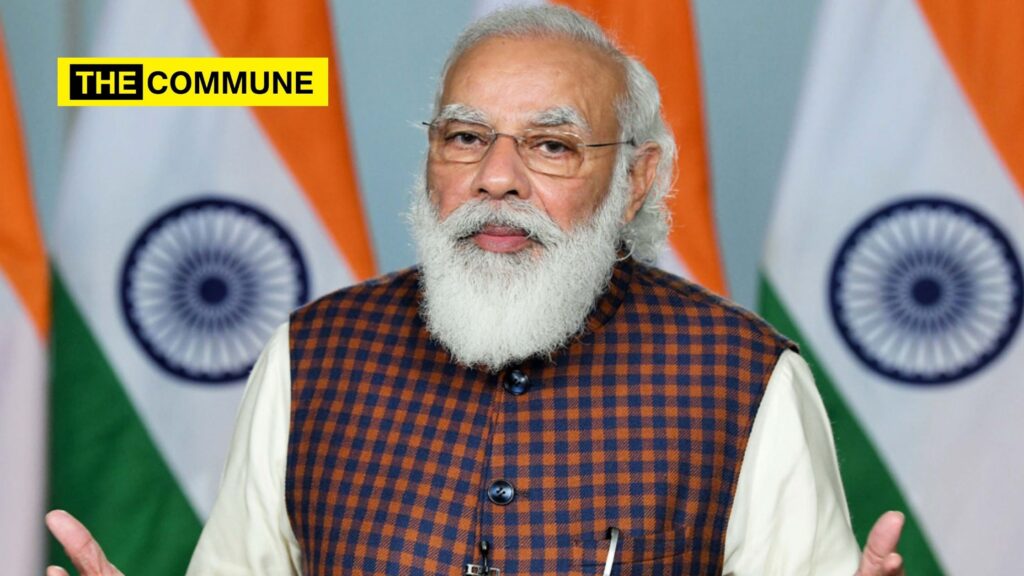Prime Minister Narendra Modi addressed the World Economic Forum’s (WEF) Davos Dialogue on Thursday via video conferencing. He spoke on the ‘Fourth Industrial Revolution – using technology for the good of humanity’. Prime Minister also interacted with top corporate CEOs during the event.
Bringing the message of confidence, positivity and hope from 1.3 billion Indians amidst these times of apprehension, PM Modi told the gathering that despite initial misgivings about India’s capacity to handle the COVID-19 pandemic, India has moved forward with proactive approach. India has worked on strengthening COVID specific health infrastructure, trained its human resource to tackle the pandemic and used technology in testing and tracking of COVID cases. In India, the fight against the coronavirus was turned into a people’s movement and India has succeeded in saving as many lives of its citizens as possible, he said. India’s success has global implications as 18 percent of the world population live here, and effective containment here saved humanity from a very big tragedy, said the Prime Minister.
Modi also talked about the world’s biggest vaccination drive and India’s global efforts during the pandemic. He talked about the evacuation of citizens when air space was closed and the supply of medicines from India to more than 150 countries. He stated that India is helping countries with online training, knowledge of traditional knowledge, vaccines and vaccine infrastructure. He informed the audience that apart from the two current made-in-India vaccines, more vaccines are in the pipeline, which will enable India help the world at a greater scale and speed.
The Prime Minister also informed the forum about steps being taken on the economic front. He said that India has maintained economic activity by starting infrastructure projects worth billions of rupees and initiating special schemes for employment. Earlier we focused on saving lives, he said, while now everyone is focussed on the growth of the country. India’s ambition of self-reliance will strengthen globalism anew and will help in Industry 4.0, Modi noted.
He further asserted that India is working on all the four factors of Industry 4.0 — connectivity, automation, artificial intelligence or machine learning and real-time data. India is among the countries where data charges are the cheapest and mobile connectivity and smart phones have reached far and wide. India’s automation design expert pool is vast and the country has made a mark in the field of AI and machine learning. Growing digital infrastructure has made digital solutions everyday part of life in India, he said.
Modi went on to state that today 1.3 billion Indians have universal ID — Aadhar — which is connected to their bank account and phone number. In December of 2020 itself, there has been ₹4 trillion worth of transactions through UPI. India could transfer ₹1.8 trillion worth of assistance through direct benefit transfer to the accounts of 760 million Indians during the pandemic. Digital infrastructure has made public service delivery efficient and transparent, he added. India has started a campaign for providing easy access to healthcare by giving Unique Health ID to its citizens, he further informed the gathering at WEF, Davos.
PM Modi went on to assure the forum that India’s Aatamnirbhar Bharat (Self -Reliant India) movement is committed to global good and maintaining the global supply chain. India has the capacity, capability and reliability to strengthen global supply chain, he said. Its massive consumer base will further grow and help the global economy, he assured the forum.
Modi also spoke about the continued emphasis on reforms and incentive based stimulus in India. Structural reforms during times of the pandemic have been supported by production-linked incentives, he said. India offers ease of doing business, as there is a predictable and friendly environment from tax regime to FDI norms. And to top it all, India is matching its growth with the goals of climate change, he added.
Furthermore, he cautioned that technology should become a tool of ease of living, and not a trap.
During the question-answer session, Prime Minister Modi explained to Joe Kaeser, President & CEO, Siemens, the contours of the Aatmanirbhar Bharat campaign and said that making India a manufacturing and export hub is a big part of that vision. He also invited the global players to take advantage of the $26 billion production-linked incentive (PLI) schemes. Replying to Bjorn Rosengren, CEO, ABB, Modi listed out the ongoing infrastructure projects in the country and informed the gathering that under the National Infrastructure pipeline, projects worth $1.5 trillion will be implemented in the country in the next five years. To Ajay S Banga, CEO, Mastercard, Modi elaborated on the massive financial inclusion that has taken place in the country in the recent times and the steps that were undertaken to strengthen the MSME sector. In a reply to an observation from Arvind Krishna of IBM, he emphasized the depth of Digital India. He affirmed that the country’s digital profile has completely transformed. The government’s vision is to transform the country through access, inclusion and empowerment while ensuring the privacy of the user, he declared. To Nobuhiro Endo, Chairman of the Board, NEC Corporation, PM Modi described India’s approach towards opportunities created by urbanization. India is focussing on sustainable urbanization with focus on ease of living, ease of doing business and climate sensitive development, he explained. This commitment has led to an investment of $150 billion in urban India from 2014 to 2020, he specified.
(Published from PIB)
Click here to subscribe to The Commune on Telegram and get the best stories of the day delivered to you personally.

